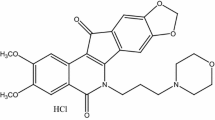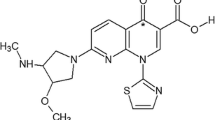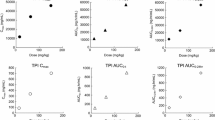Abstract
Purpose. The conformationally rigid nucleoside, N-methanocarbathymidine [(N)-MCT] exerts a potent antiproliferative effect both in vitro and in vivo against murine colon cancer cells (MC38) expressing the herpes simplex virus thymidine kinase gene (MC38/HSV-tk). Metabolic studies have revealed that high levels of (N)-MCT triphosphate accumulate in transduced cells and are incorporated into DNA, resulting in cell death. The objective of the present study was to assess the pharmacokinetic profile of (N)-MCT in C57BL/6 mice bearing nontransduced MC38 and MC38/HSV-tk tumors.
Methods. Male black C57BL/6 mice bearing subcutaneous tumors derived from wildtype and HSV-tk-transduced MC38 murine colon cancer cells in the left and right flank, respectively, were treated i.p. with radiolabeled (N)-MCT (100 mg/kg). Mice were killed at each of the predetermined times after drug administration. Blood, urine, tumors and various organs and tissues were obtained for measurement of drug levels.
Results. Plasma and tissue concentrations of (N)-MCT peaked at 0.25–0.5 h. The major pharmacokinetic parameters calculated for (N)-MCT in plasma were: T1/2β 4.7 h, AUC 147 µg·h/ml, CL 0.69 l/kg per h. The penetration of (N)-MCT into brain and testes was slow. Between 4 and 24 h after drug administration, the levels of (N)-MCT measured in HSV-tk-expressing tumors were significantly higher than in wildtype tumors. HPLC analysis of methanolic extracts of plasma and urine obtained at various times after drug administration revealed no (N)-MCT metabolites in the plasma, and the compound was secreted unchanged in the urine.
Conclusions. After i.p. injection into mice, (N)-MCT was rapidly absorbed and distributed in all organs examined. No drug metabolites were detectable in plasma and the compound was secreted unchanged in urine. These results are essential for the future development and in postulating the most efficient use of (N)-MCT in the HSV-tk enzyme prodrug system for gene therapy approaches for the treatment of cancer.
Similar content being viewed by others
Author information
Authors and Affiliations
Additional information
Electronic Publication
Rights and permissions
About this article
Cite this article
Noy, R., Ben-Zvi, Z., Elezra, M. et al. Pharmacokinetics and organ distribution of N-methanocarbathymidine, a novel thymidine analog, in mice bearing tumors transduced with the herpes simplex thymidine kinase gene. Cancer Chemother Pharmacol 50, 360–366 (2002). https://doi.org/10.1007/s00280-002-0505-8
Received:
Accepted:
Issue Date:
DOI: https://doi.org/10.1007/s00280-002-0505-8




